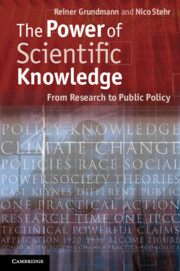1 - Introduction
Published online by Cambridge University Press: 05 November 2012
Summary
The roads to human power and to human knowledge lie close together, and are nearly the same; nevertheless, on account of the pernicious and inveterate habit of dwelling on abstractions, it is safer to begin and raise the sciences from the foundations which have relation to practice and let the active part be as the seal which prints and determines the contemplative counterpart.
Francis Bacon, 1620 (Book II, 4)The fact that science contributes to the social life-process as a productive power and a means of production in no way legitimates a pragmatist theory of knowledge.
Max Horkheimer ([1932] 1972: 3)The prevailing view
In order better to understand the task we have set for ourselves in this study, it is useful first to refer to the prevailing view in response to the question of the conditions that make for the Power of Knowledge. The two mottos above, Horkheimer’s taken from an essay written in 1932 for the inaugural issue of the Zeitschrift für Sozialforschung, and Francis Bacon’s from Novum Organum of 1620, both endorse a clear separation between questions pertaining to the truth and utility of knowledge. The distinction between truth and utility is one of the traditional philosophical distinctions in reflections about attributes of knowledge that may make ideas powerful in practice. The year 1932 is symbolic and significant, of course, and Horkheimer’s insistence that it is not for societal interests to decide what is true echoes emerging, profound political struggles about the role of science in society. Science and the ideas that materialize from the scientific community are not the handmaidens of power, nor should they be deprived of their proper autonomy. In defending the autonomy of science, Horkheimer ([1932] 1972: 4) also insists that the philosophical perspective that favors a clear separation between the utility and the truth of knowledge does not lead to a separation or alienation between theory and action (practice).
- Type
- Chapter
- Information
- The Power of Scientific KnowledgeFrom Research to Public Policy, pp. 1 - 21Publisher: Cambridge University PressPrint publication year: 2012



